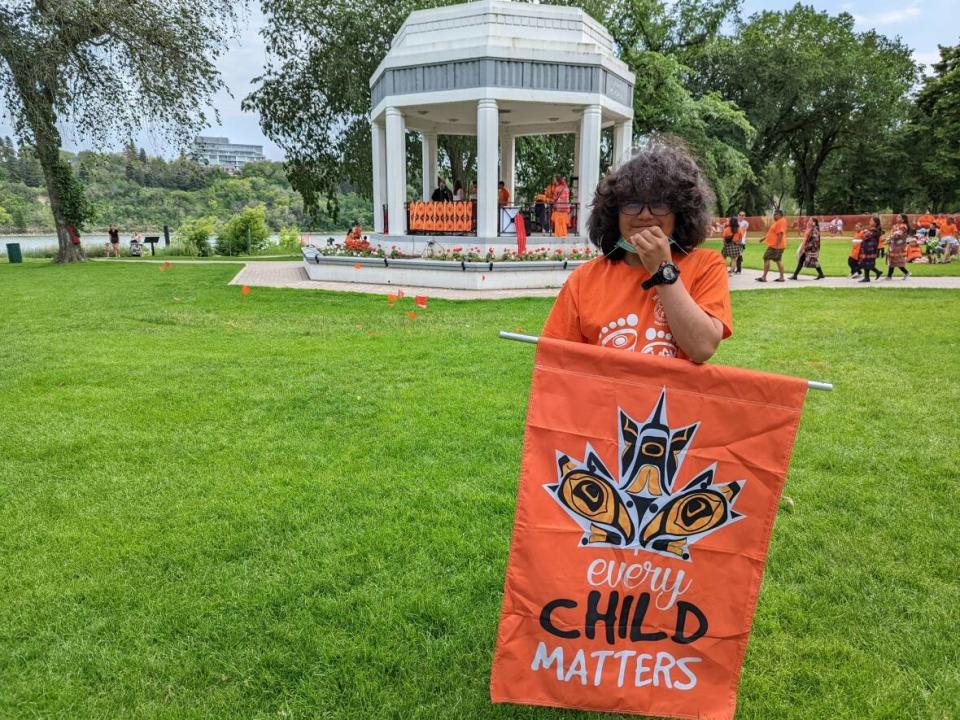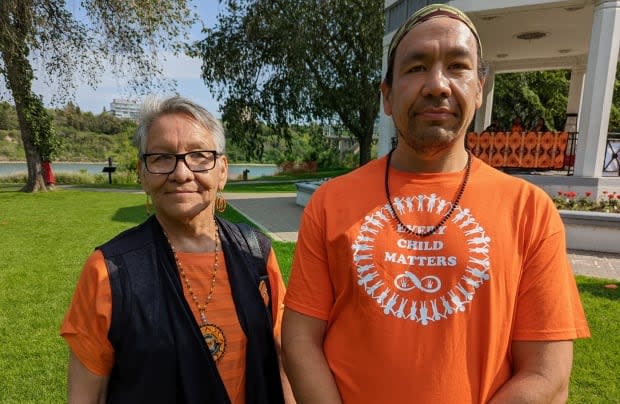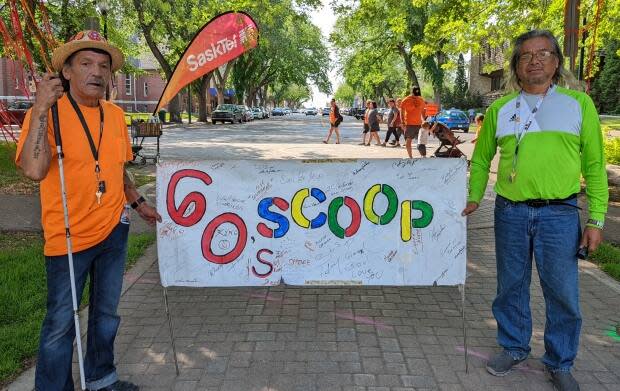July 1 celebrations need to evolve, attendees at Saskatoon Cancel Canada Day event say

Saskatoon streets were coloured Friday with people in red, white and orange, in a mingled commemoration of Canada's brightest and darkest moments.
People at the Cancel Canada Day event in Kiwanis Memorial Park said the July 1 celebrations taking place in the city and across the country don't recognize Canada's past and present harms, noting the residential school system and the issue of missing and murdered Indigenous women and girls.
Ron McHugh looked to the history of Canada, saying that the country's foundation relied on the genocide of Indigenous people.
"Canada [Day] is literally a celebration, in one respect or another, of the genocide that happened," he said.
"Maybe you don't know, but you have to know and educate yourself on the history of this country."
The July 1 holiday needs to evolve and be renamed to encompass all of Canada's history, he said.

Beside him, his mother, Judy Pelly, said Canada Day can be a celebratory event for people in different ways — people who may have immigrated from war-torn countries, for example. But for the people who have been here the longest, it's not.
"For Indigenous peoples it's a time of remembering all those historical injustices that happened to us after colonization," she said, pointing to the residential schools Indigenous children were forced to attend, which "destroyed us, destroyed our language and our culture."
"It's not really a time for celebration — for us, anyways."
'Celebrating genocide'
Allison Forsberg, one of the organizers of the Cancel Canada Day event, agreed.
"Canada Day is celebrating genocide, basically," said Forsberg, who helped lead Saskatoon's inaugural event in 2021.
Some people don't understand the drive behind the Cancel Canada Day event, she said — but added that others don't understand the Canada Day celebrations.

While the Kiwanis Park event remembered the harmful events of Canadian history and was intended to work toward healing, she said that many conventional Canada Day celebrations revolve around drinking and partying, rather than reflection.
Canada Day as it is now celebrates a history that has been traumatic for Indigenous people, Forsberg said.
David Fineday carried a banner with the names of people he said were involved in the Sixties Scoop, during which child welfare authorities took Indigenous children from their homes and placed them with non-Indigenous.
The names included his own — Fineday was among the thousands of children taken from their homes through the practice, which continued into the 1980s.
He wants people to know and understand what the Sixties Scoop was, and what it did.
WATCH | What was the Sixties Scoop?
Fineday said Canada Day emphasizes a celebration of European ideals and needs to expand to be more inclusive, including celebrating Indigenous history. He'd also like to see Indigenous insignia added to the Canadian flag.
"I have no reason to celebrate Canada Day. I have a reason to celebrate thousands and thousands … of years of history of this land, Treaty 6 territory," Fineday said.

Sierra Bird, who was at Kiwanis Park in honour of her mushum, or grandfather — a residential school survivor — said the event was mainly to raise awareness.
She feels people still don't understand what happened at residential schools, and they ought to know.
"We're just cancelling Canada Day until we can all come together in peace, harmony and love," Bird said.
"We're not looking down on each other, but mostly [here] just to raise awareness and be as one, as we should be, under the sun."
Support is available for anyone affected by their experience at residential schools or by the latest reports.
A national Indian Residential School Crisis Line has been set up to provide support for former students and those affected. People can access emotional and crisis referral services by calling the 24-hour national crisis line: 1-866-925-4419.

 Yahoo Movies
Yahoo Movies 